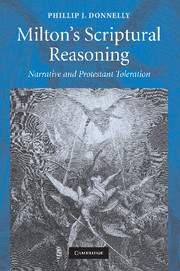Book contents
- Frontmatter
- Contents
- Preface and acknowledgments
- Abbreviations and editions
- 1 Introduction: Scriptural reasoning
- PART I SCRIPTURAL REASONING IN MILTON'S PROSE
- PART II BIBLICIST RHETORIC AND ONTOLOGY IN PARADISE LOST
- PART III BIBLICIST POETICS AND HERMENEUTIC ETHICS
- Part III introduction
- 8 Biblical metanarrative as rule of faith
- 9 Paradise Regained as rule of charity
- 10 Samson Agonistes as personal drama
- Notes
- Subject index
- Index of Scripture references
10 - Samson Agonistes as personal drama
Published online by Cambridge University Press: 04 September 2009
- Frontmatter
- Contents
- Preface and acknowledgments
- Abbreviations and editions
- 1 Introduction: Scriptural reasoning
- PART I SCRIPTURAL REASONING IN MILTON'S PROSE
- PART II BIBLICIST RHETORIC AND ONTOLOGY IN PARADISE LOST
- PART III BIBLICIST POETICS AND HERMENEUTIC ETHICS
- Part III introduction
- 8 Biblical metanarrative as rule of faith
- 9 Paradise Regained as rule of charity
- 10 Samson Agonistes as personal drama
- Notes
- Subject index
- Index of Scripture references
Summary
If the “soul,” or living form, of all the virtues is, for Milton, the ethical charity embodied by the Son in Paradise Regained, why does Milton pair the publication of his brief epic in 1671 with Samson Agonistes? If Milton truly rejects enthusiasm for carnal warfare, as I contend in the preceding chapter, why does Samson Agonistes seem to legitimate divinely inspired violence? Attempts to explain the paired publication of these texts tend to argue that each hero presents either a complement or a contrast to the other and to connect the pairing to some aspect of the political context. In a further sense, Samson Agonistes also contrasts with Milton's other major poems in its careful avoidance of the explicit typological intertextuality that we have traced in the preceding chapters. As a result, we should not be surprised that neither ontic charity nor ethical charity gets much explicit treatment in the play; nevertheless, the play is indeed centrally concerned with the relation between “right reason,” or conscience, and genuine virtue. Rather than referring to “ethical charity,” the analysis here refers to Samson's concern for “virtuous action,” or “sanctification.” I contend that the central question for Samson is whether he, as the particular person that he has become, is capable of co-operating with divine action in the world, rather than being merely used despite himself. In short, Samson attempts to discern whether he in particular is capable of virtuous action.
- Type
- Chapter
- Information
- Milton's Scriptural ReasoningNarrative and Protestant Toleration, pp. 201 - 227Publisher: Cambridge University PressPrint publication year: 2009

